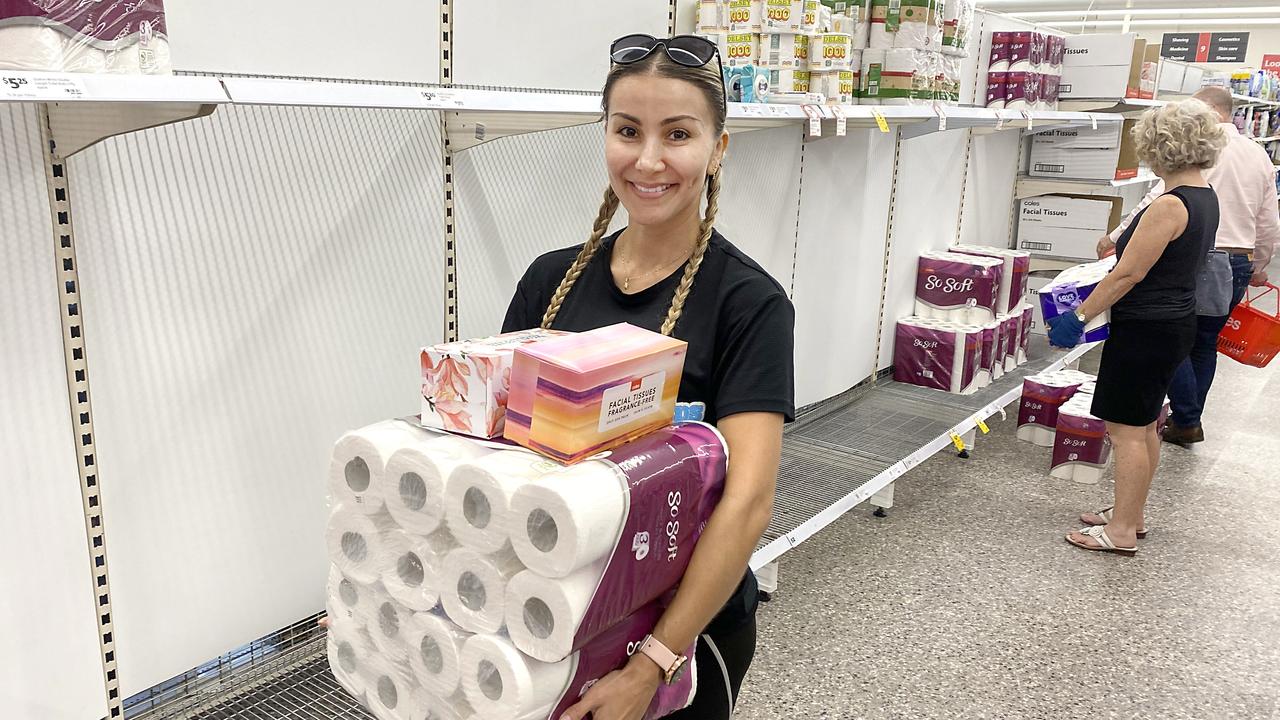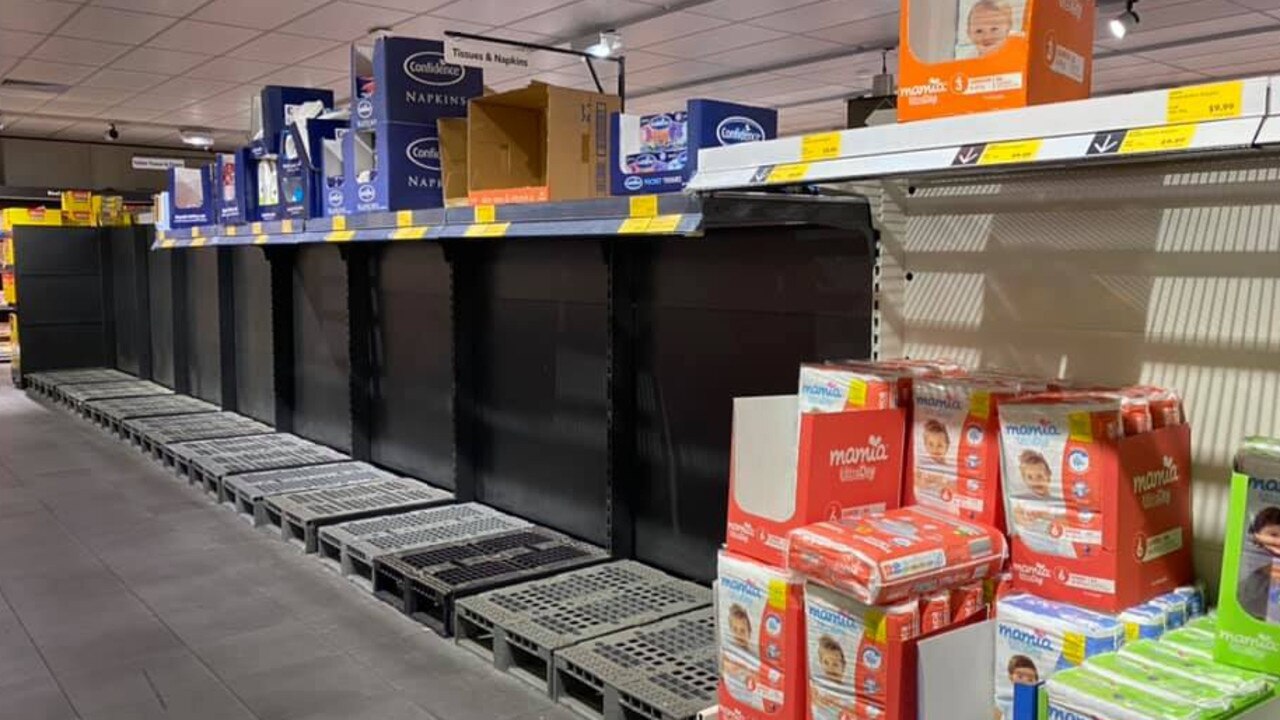Science behind why Australians are panic buying toilet paper
Australians have left the world puzzled by their panic buying of toilet paper. This is the reason why we are reacting so strangely.

Anxious Australians are buying toilet paper to deal with their worries about coronavirus but they should be considering other ways to relieve their stress.
While other countries have run low on toilet paper, Australians are stockpiling despite there being no threat of running out as 60 per cent of the country’s toilet paper is manufactured locally.
Vision of Aussies scrambling over each other to panic-buy multi-packs of toilet paper has been beamed across the world, leaving many puzzled.
So why is everyone panicking?
Dr Paul Harrison, a human behaviour expert at Deakin University, explained the reasons why Australians in particular were stocking up on toilet paper.
“Research shows that in capitalist cultures like Australia, you deal with problems by buying things,” he told news.com.au. “Through times of trouble we are encouraged to spend our way out of it.”
Dr Harrison said humans in general were drawn to “simple answers” in times of crisis.
“Coronavirus is an abstract problem, with an unclear effect and it’s unfolding minute-by-minute,” he said.
“Humans struggle with nuance and unclear outcomes and research shows that when people feel like they have lost control, they tend to be drawn to small things that they can control.
“In Australia we are constantly told that we can solve problems by buying things, and research shows that buying utilitarian items such as toilet paper and cleaning products can rebalance that sense of lack of control.”
One example of Australia’s tendency to throw money at something to solve a problem, was the current calls for a stimulus package to boost Australia’s economy.
“I’m not saying that it can’t,” Dr Harrison said. “But it makes it seem like the simple solution is to buy stuff.”
A secondary “herd effect” happens because people can see shortages happening and they don’t want to be the one left without toilet paper.
TAKE OUR POLL: 11 biggest coronavirus questions

There is also a cultural aspect to the panic buying related to Australia’s individualistic attitude.
“Australians as a culture tend to think predominantly as individuals and we value things around assertiveness and independence,” Dr Harrison said.
People who have individualistic tendencies tend not to feel supported by the community when things fall apart.
“So in this kind of person with individualistic tendencies, amid stress and when the world feels chaotic, they fend for themselves and their family.”
Australians have shown they can pull together as a community in times of crisis like this year’s bushfire emergency but Dr Harrison said coronavirus was different.
“It is quite isolating, if you get it, you will metaphorically and quite literally be isolated,” he said. “So if you get it, people feel they need to look after themselves and their family.”
RELATED: Follow the latest coronavirus updates
RELATED: Why people are stocking up on toilet paper

Dr Harrison said trust in politicians and institutions was also at an all-time low and this exacerbated the feeling that people were on their own.
“Something like 80 per cent of people don’t trust our institutions, which is not a great thing,” he said.
“If a leader or (institutions like) the banks are not there in a time of need, it does erode your trust in them.”
While some have questioned the usefulness of buying toilet paper, Dr Harrison said it came down to people feeling unsettled and wanting to take action.
“Two things need to be satisfied: they need to be able to perform that action and for it to lead to an end state of feeling in control, and buying toilet paper satisfies both these,” he said.
“If you think about it rationally it doesn’t make sense but most behaviour is not rational, it’s emotional.”
Even when people make an emotional decision, Dr Harrison says that the cognitive brain will later provide a rational basis for that decision.
All of these factors came together to explain Australia’s obsession with stocking up on toilet paper.
“Buying toilet paper doesn’t make sense but it does,” Dr Harrison said. “It’s something people do buy weekly and you do need toilet paper, you just don’t need 100 rolls.”
For people who want to ease their anxiety about coronavirus but want an alterative to buying toilet rolls, Dr Harrison suggested thinking about other people.
“One way of reducing anxiety is to do things for other people,” he said. “Thinking about what things you can do for others also provides that sense of reward.”
Supermarkets have urged shoppers not to stockpile as shelves are being constantly restocked. They have urged shopped to think of more vulnerable members of the community who may not be able to shop often or get to different stores in search of products.
A Coles spokesperson said the supermarket did not advocate hoarding of goods and said shelves were being regularly restocked.
“Coles is committed in delivering the best service to all Australians and during this challenged time is committed in ensuring all Australian communities have access to the products and services we all need. Coles wants to ensure that no matter where you live or how old you are, you have the same access as everyone else on your street.”
Continue the conversation @charischang2 | charis.chang@news.com.au




